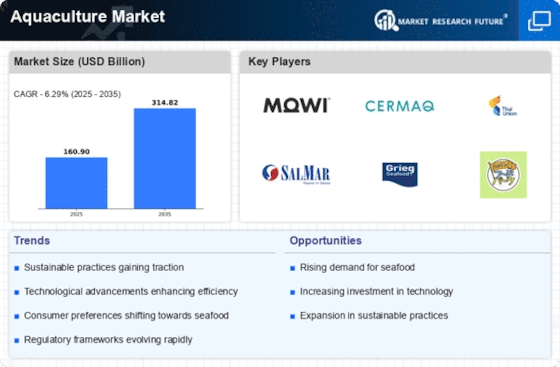Market Analysis
In-depth Analysis of Aquaculture Market Industry Landscape
aquaculture market is set to reach US$ 237.3 BN by 2030, at a 5.71% CAGR between years 2022-2030. Market dynamics associated with the aqua culture sector are determined by a series of interactions from various circles such as economic, environmental technological and regulatory practices. One of the main catalysts is rising world consumption for sea-food as de facto-high protein source. Since the world’s wild fish stocks are under threat from overfishing and degrading environments, aqua farming proves to be eminent means towards eliminating this hunger void. Most of the industries dynamics are influenced by increasing global population, urbanization, and changing trends towards food consumption which has continuously created sustained and dynamic demand for aqua products. The concept of environmental sustainability is considered as a vital factor that determines the dynamism of market in aquaculture. Unfortunately, where forms of well managed aquaculture have sustainability issues – as in the case of pollution or over harvesting – consumers, regulators and organizations involved in this industry work hard to rid themselves from any negative environmental criticism. Dynamic market forces are affected by the efforts for constructive, sustainable methods, causing a change to activities such as integrated multi-trophic aqua culture (IMTA), where different sorts of species are used in their cultivation and results in optimal use of resources and minimum impact on the environment. Also, the rapid technological advancements often play a major role in shaping of aquaculture market’s dynamics. Advances in the aquaculture technology, such as recirculating aqua culture systems (RAS) and automated monitoring technologies aid to reduce input levels, improve efficiency by reducing environmental footprint through effective waste disposal and optimization of nutrients’ utilization and save overall time required for agricultural processing. There is another technological component in the development of selective breeding programs and apply innovative genetics that contribute to market dynamics by increasing growth rates, disease resistance, and general quality standards for farmed species. Quality: All these technological advances improve performance in this industry to handle growing demand while ensuring that environmental and economic issues are addressed. The sustainability of the aqua culture industry is determined by economic factors like cost incursions, prices, and global dynamics relevant to this market. Operational costs are dependent on the prices of feeds, energy and disease control measures that are used in aquaculture. Revenues streams for the industry participants, on the other hand, are determined by market prices of aquaculture products that always reflect several factors like consumer demand regulatory standards and competition. Also, global trade patterns, such as import-export rule and market openness are other significant factors for determining the market dynamics of aquaculture especially in countries that participate in international seafood movement.



















Leave a Comment